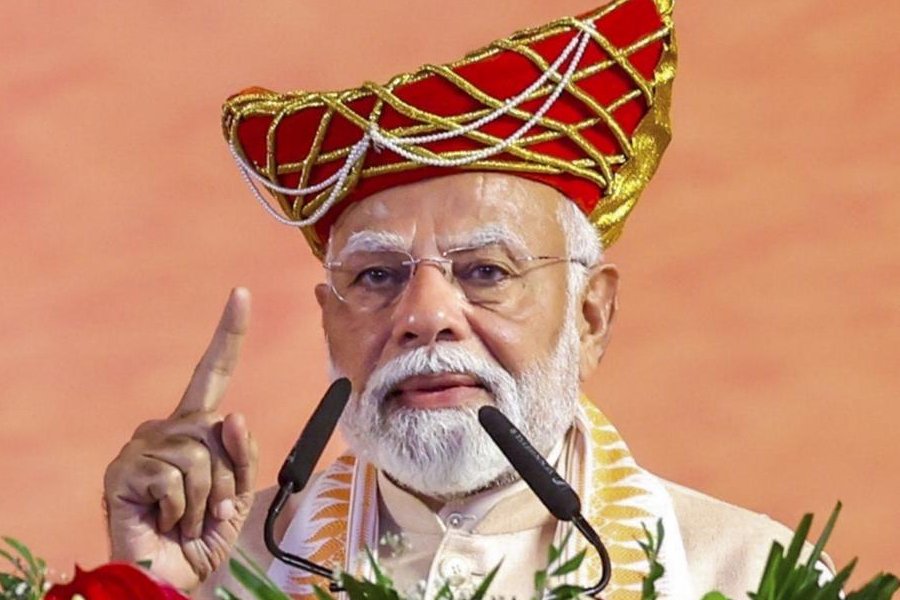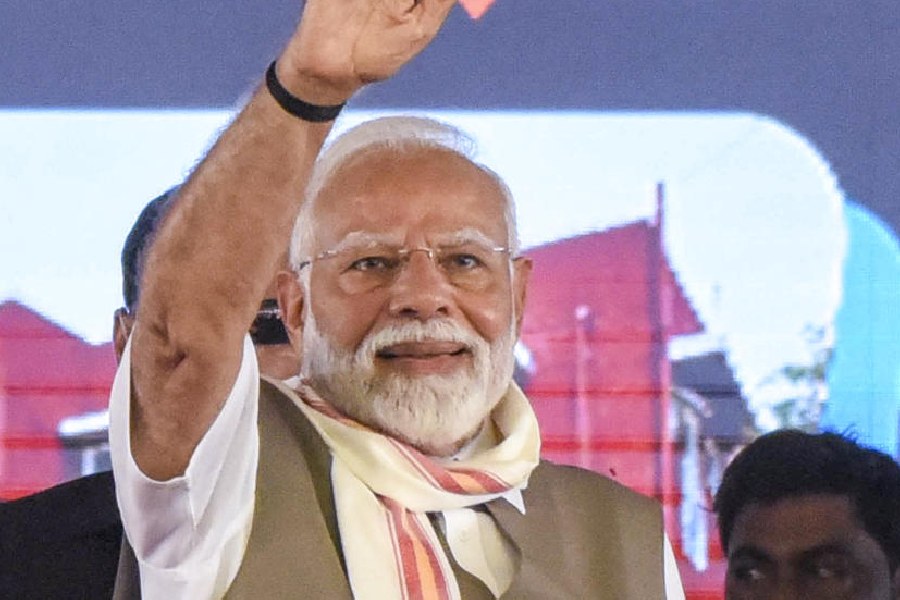Prime Minister Narendra Modi on Saturday said proxy wars by terrorists will not work and bullets will be answered with cannon balls, adding that 'sindoor' has become a symbol of valour following India's response to the Pahalgam terror attack.
He also described Operation Sindoor as the biggest and most successful anti-terror operation in the country's history.
Speaking at the 'Lokmata Devi Ahilyabai Mahila Sashaktikaran Maha Sammelan' here on the occasion of the legendary queen's 300th birth anniversary, Modi said, "Through a decisive response, Bharat gave a message that proxy war by terrorists will not work. Bharat, a land of culture and values, sees sindoor as a symbol of women's power. Today, that same sindoor has become a symbol of our valour and resistance to terrorism."
"If you fire bullets, then rest assured that they will be answered with cannon balls," Modi said.
"India is a country of culture and traditions, and sindoor is a symbol of women power in our tradition. Hanuman ji, who is immersed in Ram Bhakti, also sports sindoor. We offer sindoor in Shakti Puja. This sindoor has become a symbol of bravery," he said.
Earlier this month, Indian armed forces carried out missile strikes on nine terror targets in Pakistan and Pakistan-Occupied Kashmir under Operation Sindoor. The operation was conducted two weeks after the massacre of 26 civilians in Kashmir's Pahalgam.
Sindoor or the vermillion mark symbolises the marital status of Hindu women, and its use as the operation's name resonated powerfully in light of the April 22 Pahalgam massacre.
"In Pahalgam, terrorists not only shed the blood of Indians, but also attacked our culture. They tried to divide our society and the biggest thing is that they challenged the women power of India," Modi said.
"This challenge has sounded the death knell for terrorists and their handlers. Operation Sindoor is the biggest and most successful operation in the history of India against terrorists. While the Pakistan army could not even imagine, our army destroyed the terrorist hideouts," he added.
Talking about the Nari Shakti Vandan Adhiniyam, also known as the Women's Reservation Bill, which aims to reserve one-third of the total seats in the Lok Sabha and state legislative assemblies, the PM said, "This time, 75 women have become members of Parliament. Our effort is to increase this number." This is the spirit behind the Nari Shakti Vandan Adhiniyam. Women reservation in Parliament and state assemblies had remained pending for a long time, but has been achieved now, he said.
"This means the BJP government is empowering our sisters and daughters at every level and in every field," he said.
He also said the world is witnessing the capability of India's daughters in the defence sector today.
"To achieve this, the government took many steps in the last decade. From school to the battlefield, the country today has unprecedented faith in the bravery of its daughters," he said.
Referring to Lieutenant Commanders Roopa A and Dilna K, who recently returned to India after circumnavigating the globe in a sailing boat, the PM said the two brave daughters of the Navy completed the 250-day voyage.
"They circumnavigated the earth by travelling thousands of kilometres in a boat that runs not on a motor but on wind. Imagine staying at sea for 250 days," he said.
He also praised Ahilyabai Holkar, describing her as the guardian of India's heritage. She protected the country's temples and pilgrimage sites when they were being attacked, he said.
"Our government is working on the mantra of 'Nagrik Devo Bhava' (citizen is god), which was the philosophy of Ahilyabai Holkar," he added.
Rani Ahilyabai Holkar was born on May 31, 1725, at Chondi village in Maharashtra's Ahilyanagar. She ruled the Malwa region of central India from 1767 to 1795, as the queen of the Holkar dynasty in the Maratha Empire.
"When we talk of girls' marriageable age, some people in the country see secularism in danger. They think it is against our religion. But Devi Ahilyabai thought about the marriageable age of girls in those times," he said.
"She got married at an early age. She knew the way to girl's progress. In Malwa Sena, she created a special battalion of women. These people of the western world do not know. They curse us in the name of the rights of women and try to portray us in a bad light. Women were in our army even 250-300 years ago. At village level, she created safety groups for women," Modi noted.
"When the country was in shackles of slavery 250-300 years ago, it was not easy to do something so impactful that future generations would remember it. But Devi Ahilyabai did it. She never separated devotion to God from service to the people," he said.
She was a great guardian of India's heritage. When temples and pilgrimage sites were being attacked, she took the initiative to rebuild and preserve them, including Kashi Vishwanath, he added.
"I consider myself fortunate that the same Kashi has given me the opportunity to serve. When you visit Kashi today, you will find signs of Ahilyabai's work. She created a model of governance where the poor and deprived were given priority," he added.
Earlier, Modi released a commemorative stamp and Rs 300 coin to mark her birth anniversary.
Except for the headline, this story has not been edited by The Telegraph Online staff and has been published from a syndicated feed.











